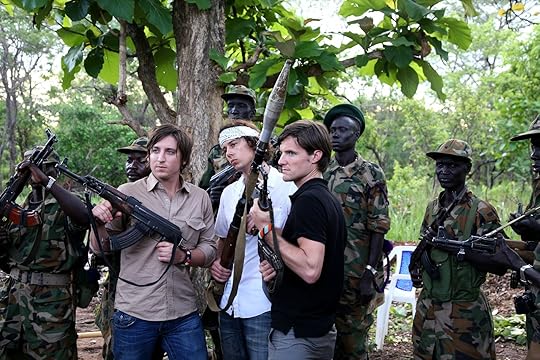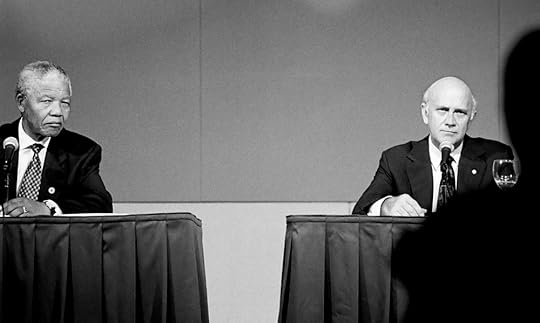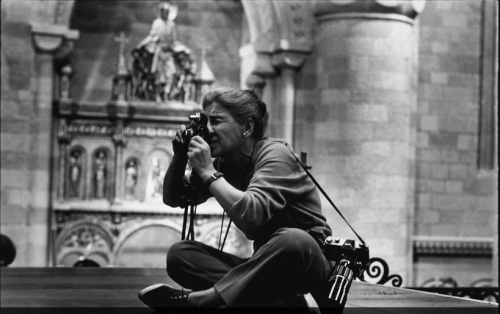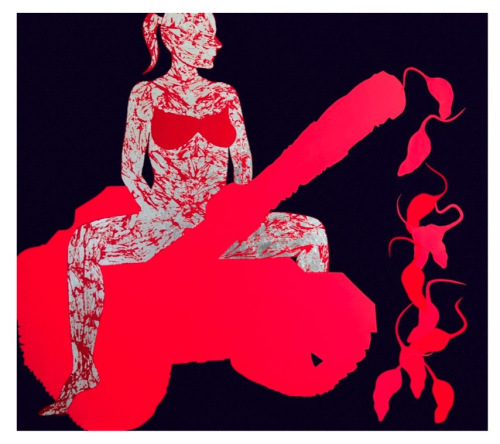Sean Jacobs's Blog, page 554
March 7, 2012
The #Kony2012 show

Photo by Glenna Gordon. Sudan-Congo border, April 2008
The boy had lost his brother, and as he wept before Jason Russell's camera, Jason Russell brushed back the loose strands of his magnificent blond coiffure (who will play him in the movie version?) and told the boy in hushed tones: "It's okay. It's okay." Jason Russell promised the boy that he, Jason Russell, would do everything he could, would stop at nothing, would move mountains if need be, just to make sure that everybody in the world would finally come to know the name of Jason Russell.
Wait! Sorry! The name of Joseph Kony. This is all about Joseph Kony after all. Not Jason Russell. Nope, nothing at all to do with him.
It must be because "Kony 2012" is about Joseph Kony and not about Jason Russell that there is so much footage of Jason Russell's young son, Gavin, worshipping Jason Russell atop trampolines and on beaches and at kitchen tables, and professing his hope that one day he might grow up to be just like Jason Russell.
Obviously! I mean how the hell else do you make a movie about the Lord's Resistance Army?
And so it was that Jason Russell came to make a film (well, the eleventh version) in which the heroic Jason Russell makes a film in order that everyone in the world should finally know the name of the internationally-renowned, globally notorious, definitely already world-famous warlord, Joseph Kony. It was to be the untold story of a much-chronicled man.
If this challenge were not daunting enough, Jason Russell also took it upon himself finally to convince the world that Kony, the man who had hitherto been merely the very first name on the International Criminal Court's most wanted list (indicted on 33 counts including war crimes and crimes against humanity seven years ago), should in fact be arrested.
Great Scott! Why didn't anyone think of that before?
The "Kony 2012" show is here, and the whole thing is a miserable fraud.
It's meant to be an "awareness-raising" film. What it is is a study of a bunch of vain and ignorant young people who can think and feel only in cliches and appear to be laboring under the notion that Mark Zuckerberg invented both compassion and democracy for them sometime around 2004.
They want to empower you. And as a group of entitled white Americans, they know exactly what real power looks like. That's why they're giving you the chance to demand that America wage yet another bloody war based on zero knowledge and maximum hysteria whipped up over the wickedness of a single foreign figure. This is what democracy looks like according to Jason Russell: the power to choose on Twitter and Facebook who is to be the next target of America's moral manhunt, all with the benediction of a panel of biddable celebrities.
You say Zooey Deschanel has tweeted that she wants to stop Joseph Kony? You say Kony has reduced Vanessa Hudgens to tears? But of course, we must send in the drones.
A writer from Northern Uganda, Musa Okwonga writes in Britain's Independent that he hopes the Invisible Children "see this campaign as a way to encourage wider and deeper questions about wholly inadequate governance in this area of Africa."
And this, generally, has been the considered view offered by those fair-minded folk who recognise the film's sheer idiocy but hope that the "awareness" raised by it will lead to intelligent engagement further down the line.
Unfortunately this completely misses the point. The point of the film is absolutely not to encourage deeper questioning of Ugandan governance. The name of Uganda's Life President Yoweri Museveni is nowhere to be found. Instead the point is to "literally cry your eyes out" (see Twitter passim), having been moved into a frenzy of moral clarity by the quite revolting mixture of generalised disgust at black Africa, infatuation with white American virtue and technological superiority, and a dose of good old-fashioned blood-lust. (When it boils down to it, it is a call for assassination.)
You then parade your borrowed and branded sense of right and wrong (those production values are also your values, after all) by sharing the link to the film. Everyone except for Joseph Kony gets to feel that they're in the right, and Jason Russell and his friends get famous for being good.
The problem with the "awareness" argument is that it suggests that interest in the war in Uganda can be separated out from the experience of intensely racialized and charisma-driven moral masturbation, an experience which turns out to be, more than anything, one of the most intensely satisfying kinds of identity-formation.
"Fight for that," says one speaker, without letting on what "that" is, "because that is what is going to change this world, and that is what defines us."
To ask people to climb down from the soaring heights of "Kony 2012" (remember how we fall down into Uganda from the heavenly realms of Jason Russell's Facebook page?), a place where they get to feel both sanctified and superior, and truly descend into the mire of history and confusion is simply too big an ask. It would be boring and difficult and it would not be about Facebook or Angelina Jolie or coloured wristbands or me. When the euphoria evaporates and the Twittersphere has dried its tears (probably by the end of this week), all that remains will be yet another powerful myth of African degradation beneath Western power–and Jason Russell will be famous and rich.
The blogging battles that have broken out in the past couple of days are welcome. This is being contested and the controversy, as well as the campaign, is becoming a big deal.
Foreign Policy features an excellent guest post (by Oxford student Michael Wilkerson) where he indulges in a spot of light fact-checking (whatever, so Kony and the LRA aren't in Uganda, meh), points to Invisible Children's dubious finances (surprise!), links to a strong piece by Ugandan journalist Angelo Izama and poses the timeless question: what are the consequences of unleashing so many exuberant activists armed with so few facts?
One consequence of all this is that in the future we'll have to get used to crowdsourced foreign policy that will come with dollops of the white man's burden and most likely won and lost in popularity contests on social media: for example, #Kony2012 was quickly displaced by #stopKony2012 at the top of the Twitter pyramid.
As for Jason Russell and Invisible Children: Earlier today a Ugandan writer friend wrote to me wearily but pithily:
Invisible Children is quite notorious. They are still stuck with the old, "sexy" Kony story even as Ugandan children die of a mysterious illness [nodding disease]. They refuse to move on. Man, those guys have made money marketing this idea. It's disgusting.
* Picture Credit: Glenna Gordon.








The University of Gnawa
The new video for the song "Alf Hilat" by Moroccan lute player and singer Aziz Sahmaoui (he made his name playing jazz with the late Joe Zawinul), off 'University of Gnawa', his album (it came out late 2011) of "African" sufi devotional music from the border regions of Morocco and Algeria.








Canada's 90s version of South Africa

The Canadian High Commission to South Africa, probably meaning well or deliberately unaware of the emptiness of rainbow metaphors, is looking for photographs capturing "the Rainbow Nation". They're working with the Johannesburg Bailey Seippel Gallery on this. The photographer's entries will have to display "multi-cultural, multi-ethnic and multi-racial South Africa". For real. It's not the 1990s anymore.








'Kenyan Water Project'
You have developed an online web conferencing and meeting tool. You need to build a brand for it and get people to use it. Fair. You then shoot an ad campaign to show how people can use the technology. How about a storyline about how a bunch of disparate people can come together to solve a problem … in Africa. That's the GoToMeeting brand strategy across digital and traditional media with this ad campaign above.








The Kony 2012 show

The boy had lost his brother, and as he wept before Jason Russell's camera, Jason Russell brushed back the loose strands of his magnificent blond coiffure (who will play him in the movie version?) and told the boy in hushed tones: "It's okay. It's okay." Jason Russell promised the boy that he, Jason Russell, would do everything he could, would stop at nothing, would move mountains if need be, just to make sure that everybody in the world would finally come to know the name of Jason Russell.
Wait! Sorry! The name of Joseph Kony. This is all about Joseph Kony after all. Not Jason Russell. Nope, nothing at all to do with him.
It must be because "Kony 2012" is about Joseph Kony and not about Jason Russell that there is so much footage of Jason Russell's young son, Gavin, worshipping Jason Russell atop trampolines and on beaches and at kitchen tables, and professing his hope that one day he might grow up to be just like Jason Russell.
Obviously! I mean how the hell else do you make a movie about the Lord's Resistance Army?
And so it was that Jason Russell came to make a film (well, the eleventh version) in which the heroic Jason Russell makes a film in order that everyone in the world should finally know the name of the internationally-renowned, globally notorious, definitely already world-famous warlord, Joseph Kony. It was to be the untold story of a much-chronicled man.
If this challenge were not daunting enough, Jason Russell also took it upon himself finally to convince the world that Kony, the man who had hitherto been merely the very first name on the International Criminal Court's most wanted list (indicted on 33 counts including war crimes and crimes against humanity seven years ago), should in fact be arrested.
Great Scott! Why didn't anyone think of that before?
The "Kony 2012" show is here, and the whole thing is a miserable fraud.
It's meant to be an "awareness-raising" film. What it is is a study of a bunch of vain and ignorant young people who can think and feel only in cliches and appear to be laboring under the notion that Mark Zuckerberg invented both compassion and democracy for them sometime around 2004.
They want to empower you. And as a group of entitled white Americans, they know exactly what real power looks like. That's why they're giving you the chance to demand that America wage yet another bloody war based on zero knowledge and maximum hysteria whipped up over the wickedness of a single foreign figure. This is what democracy looks like according to Jason Russell: the power to choose on Twitter and Facebook who is to be the next target of America's moral manhunt, all with the benediction of a panel of biddable celebrities.
You say Zooey Deschanel has tweeted that she wants to stop Joseph Kony? You say Kony has reduced Vanessa Hudgens to tears? But of course, we must send in the drones.
A writer from Northern Uganda, Musa Okwonga writes in Britain's Independent that he hopes the Invisible Children "see this campaign as a way to encourage wider and deeper questions about wholly inadequate governance in this area of Africa."
And this, generally, has been the considered view offered by those fair-minded folk who recognise the film's sheer idiocy but hope that the "awareness" raised by it will lead to intelligent engagement further down the line.
Unfortunately this completely misses the point. The point of the film is absolutely not to encourage deeper questioning of Ugandan governance. The name of Uganda's Life President Yoweri Museveni is nowhere to be found. Instead the point is to "literally cry your eyes out" (see Twitter passim), having been moved into a frenzy of moral clarity by the quite revolting mixture of generalised disgust at black Africa, infatuation with white American virtue and technological superiority, and a dose of good old-fashioned blood-lust. (When it boils down to it, it is a call for assassination.)
You then parade your borrowed and branded sense of right and wrong (those production values are also your values, after all) by sharing the link to the film. Everyone except for Joseph Kony gets to feel that they're in the right, and Jason Russell and his friends get famous for being good.
The problem with the "awareness" argument is that it suggests that interest in the war in Uganda can be separated out from the experience of intensely racialized and charisma-driven moral masturbation, an experience which turns out to be, more than anything, one of the most intensely satisfying kinds of identity-formation.
"Fight for that," says one speaker, without letting on what "that" is, "because that is what is going to change this world, and that is what defines us."
To ask people to climb down from the soaring heights of "Kony 2012" (remember how we fall down into Uganda from the heavenly realms of Jason Russell's Facebook page?) a place where they get to feel both sanctified and superior, and truly descend into the mire of history and confusion is simply too big an ask. It would be boring and difficult and it would not be about Facebook or Angelina Jolie or coloured wristbands or me. When the euphoria evaporates and the Twittersphere has dried its tears (probably by the end of this week), all that remains will be yet another powerful myth of African degradation beneath Western power–and Jason Russell will be famous and rich.
The blogging battles that have broken out in the past couple of days are welcome. This is being contested and the controversy, as well as the campaign, is becoming a big deal.
Joshua Keating has an excellent post for Foreign Policy where he indulges in a spot of light fact-checking (whatever, so Kony and the LRA aren't in Uganda, meh), points to Invisible Children's dubious finances (surprise!), links to a strong piece by Ugandan journalist Angelo Izama and poses the timeless question: what are the consequences of unleashing so many exuberant activists armed with so few facts?
One consequence of all this is that in future we'll have to get used to crowdsourced foreign policy that will come with dollops of the white man's burden and most likely won and lost in popularity contests on social media: for example, #Kony2012 was quickly displaced by #stopKony2012 at the top of the Twitter pyramid.
As for Jason Russell and Invisible Children: Earlier today a Ugandan writer friend wrote to me wearily but pithily:
Invisible Children is quite notorious. They are still stuck with the old, "sexy" Kony story even as Ugandan children die of a mysterious illness [nodding disease]. They refuse to move on. Man, those guys have made money marketing this idea. It's disgusting.
* BTW, for more on the photo at the top of this post.








'An extra day to be black'
I know we're already seven days into March, but visual artist Michael Paul Britto's request for 'an extra day to be black' in mainstream media outlets, still holds. (For those in the dark, he is ripping into Black History Month.)








Mike Epps's African Jokes
Remember Mikko's post on African Jokes? Comedian Mike Epps, a few days before he threatened his daughter with violence, gets some cheap laughs at the expense of Nigerians on late night US television.* Host Conan O'Brien gently guides him away.
* Btw, Epps is merely repeating an old trope among African American comedians that some people find funny and leave others cringing.








Tank Girl
Nadine Hammam's work turned out to be "too risky" for Art Dubai. Her new exhibition, Tank Girl, opens tonight at the Gallery Misr (Cairo, Egypt).








March 6, 2012
South Africa broke photographer Eve Arnold's heart

From Financial Times profile of Eve Arnold, the brilliant American photographer who died in January 2012:
One of her toughest assignments was in South Africa, in 1973, where she saw apartheid at its worst. She sneaked inside hospitals where black children were dying from malnutrition and disease; she witnessed the separation of black families, the men forced to work in mines or in cities living in compounds hundreds of miles away. When she got back to London she was ill for months: her doctor said it was not a medical ailment, it was caused by what she had seen; he diagnosed it as heartbreak.








'Grounding Air Congo'
Diamond dealers and mobile phone executives can relax. We're talking American professional basketball. Basically Josh Smith of the Atlanta Hawks dunks the ball on the head of one of our favorite players, Serge Ibaka of the Oklahoma City Thunder. The best part is the excitement of the TV commentator 38 seconds into the video above: "[Smith] just grounded Air Congo." You have to love the announcer. This is not the first time Smith did that to Ibaka.
* Remember Ibaka? The player without a country.








Sean Jacobs's Blog
- Sean Jacobs's profile
- 4 followers









